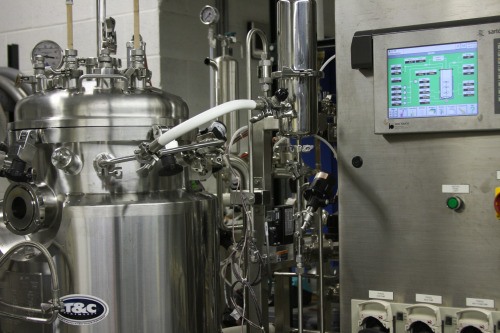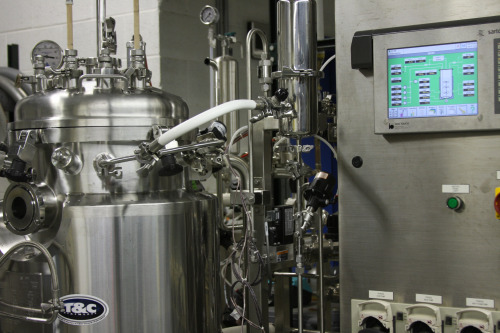 Genomatica’s pilot green chemical plant.Photo courtesy of GenomaticaYou can buy green jeans, green greens (at the farmer’s market), and green beer. But the reality is that many, if not most, products in our industrial society contain some petroleum-based chemicals.
Genomatica’s pilot green chemical plant.Photo courtesy of GenomaticaYou can buy green jeans, green greens (at the farmer’s market), and green beer. But the reality is that many, if not most, products in our industrial society contain some petroleum-based chemicals.
In fact, up to a quarter of the oil consumed in some regions of the United States — such as on the Gulf Coast — goes into petrochemical production, according to the U.S. Energy Information Administration. A number of startups, however, are working to develop green chemicals that take the petro out of petrochemicals and eliminate the environmental and safety hazards from manufacturing industrial chemicals.
A couple of years ago I wrote about one of those companies, a San Diego startup called Genomatica, that had developed a green version of a chemical compound called 1,4‐butanediol, or BDO. Your skateboard wheels, sneakers, golf balls, and a host of other products are all made with the chemical, whose manufacture alone is a $3 billion business.
At the time, Genomatica, which was spun out of the University of California, San Diego, in 2000, had only produced batches of BDO in the lab. The startup’s scientists had bioengineered a microorganism that eats water and sugar and spits out BDO. Goodbye hydrocarbons, hello carbohydrates. The microorganisms are designed and tested “in-silico” — in other words, on computers, which also simulate chemical production.
Last year, the company, which is backed by top Silicon Valley venture capital firms Mohr Davidow Ventures and Draper Fisher Jurvetson, announced that it had also bioengineered a benign version of an industrial solvent called methyl ethyl ketone, or MEK. Better yet, Genomatica planned to produce MEK in shuttered ethanol plants.
On Tuesday, Genomatica executives said they had successfully moved from the lab to small-scale production, producing 3,000 liters of BDO in a pilot plant.
“By successfully implementing the manufacturing process at this scale, we have shown that our first product is ready for commercialization and that our platform delivers,” Mark Burk, Genomatica’s chief technology officer said in a statement.
The company claims its technology can cut chemical development costs and time by 50 percent to 75 percent.
Ramping up to industrial-scale production is another matter, of course. But if Genomatica and other green chemical startups succeed, expect to see a lot more green products on the shelves in the coming years.


